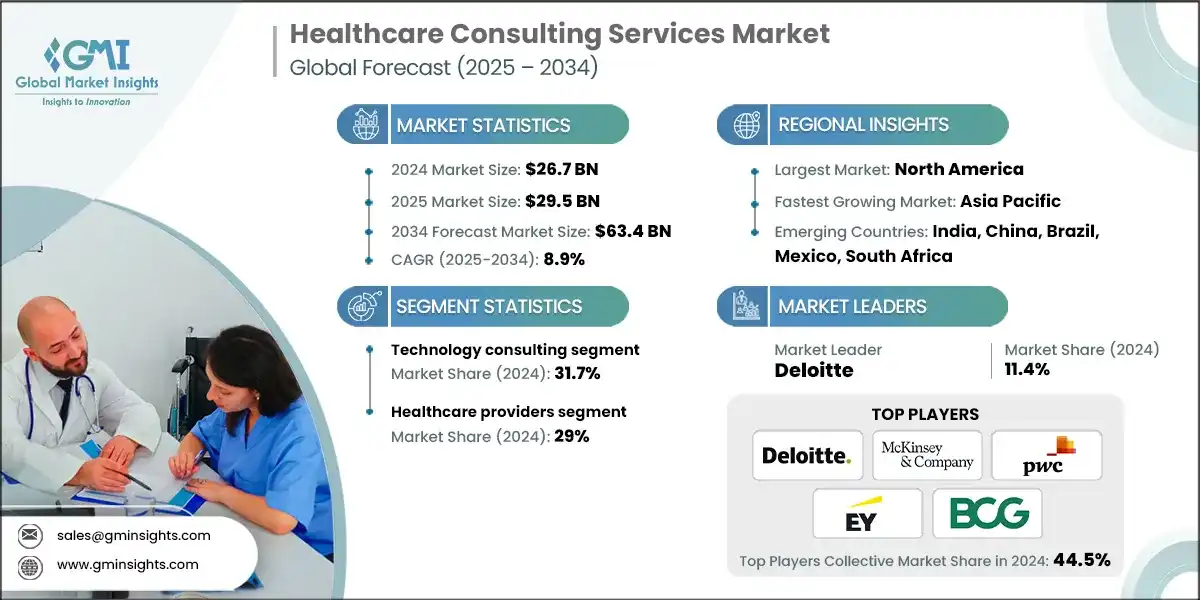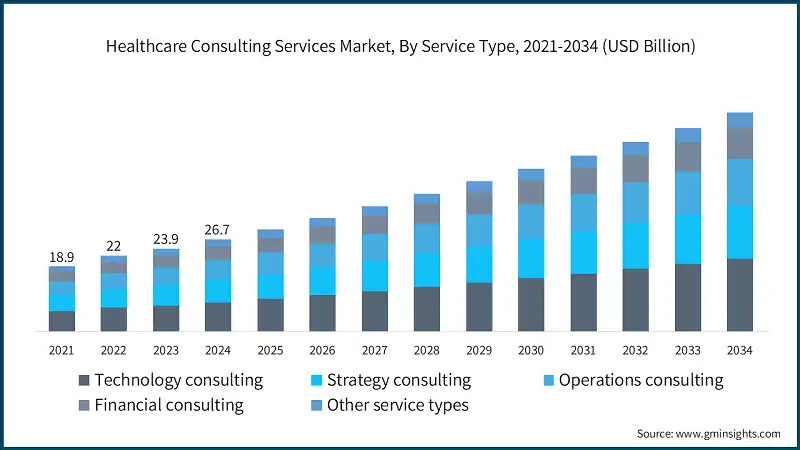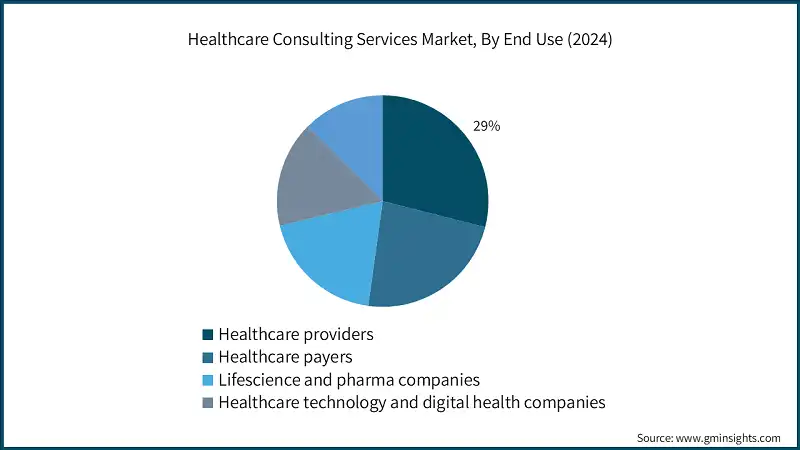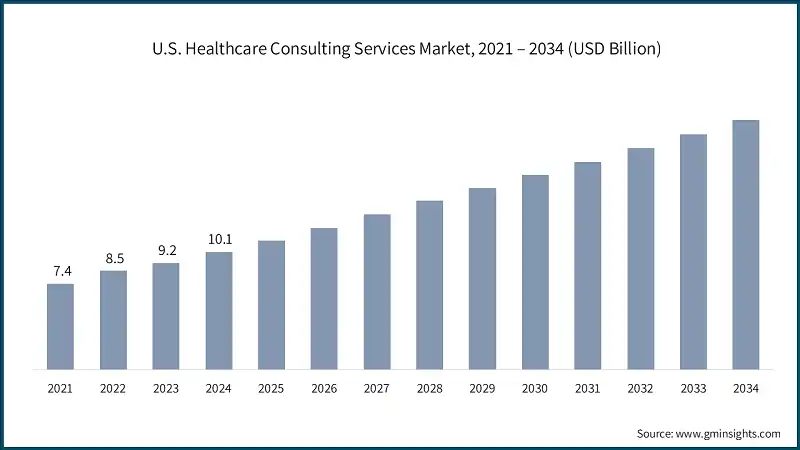Healthcare Consulting Services Market Size
The global healthcare consulting services market size was valued at USD 26.7 billion in 2024. The market is expected to reach from USD 29.5 billion in 2025 to USD 63.4 billion in 2034, growing at a CAGR of 8.9% during the forecast period, according to the latest report published by Global Market Insights Inc. The high market growth is attributed to the rising demand for digital transformation, increasing focus on cost optimization, continuous advancements in healthcare technology, and expansion of telehealth and remote patient monitoring, among other contributing factors.

To get key market trends
Download Free PDF
Healthcare consulting services provide particular healthcare expertise to the providers, payers, healthcare technology firms, and life sciences companies to improve operational efficiency, regulatory compliance, and patient care. These services include strategic planning, digital transformation, financial management, and policy adherence. Consultants help organizations navigate industry challenges, optimize workflows, and implement innovative solutions to improve overall healthcare delivery.
Leading players in the healthcare consulting services market include Deloitte, McKinsey & Company, PricewaterhouseCoopers (PwC), Ernst & Young (EY), and Boston Consulting Group (BCG). These companies maintain their competitive edge through continuous service innovation, global market presence, and significant investments in research and development.
The market has increased from USD 18.9 billion in 2021 and reached USD 23.9 billion in 2023, with the historic growth rate of 12.5%. The market growth was driven by the digital transformation & technology adoption, rising complexity of healthcare systems, rising healthcare costs & cost-optimization needs, among others.
Healthcare organizations operate in a highly regulated environment, requiring strict adherence to frameworks such as HIPAA (U.S.), GDPR (European Union), and MDR (Medical Device Regulation). Consulting firms play a critical role in helping providers and payers manage regulatory risks, safeguard sensitive data, and ensure compliance. The need for such expertise is underscored by the scale of cybersecurity threats according to The HIPAA Journal, nearly 725 healthcare data breaches were reported to the U.S. Office for Civil Rights in 2023, compromising more than 133 million records.
In parallel, escalating healthcare costs are compelling hospitals, pharmaceutical companies, and insurers to improve operational efficiency. Data from the Centers for Medicare & Medicaid Services (CMS) shows that U.S. healthcare spending rose by 4.1% in 2022, reaching USD 4.5 trillion. Likewise, the Kaiser Family Foundation highlighted a 7% increase in employer-sponsored health insurance premiums in 2023, with average family coverage costs climbing to USD 23,968. Consulting firms address these pressures by optimizing workflows, reducing waste, implementing cost-effective strategies, and supporting high-quality care delivery.
Additionally, the rapid growth of precision medicine and genomics is reshaping treatment paradigms, generating new demand for strategic consulting support. Firms are increasingly engaged in guiding organizations through regulatory approvals, market entry planning, and commercialization strategies to accelerate innovation adoption and sustain long-term growth.
Healthcare Consulting Services Market Report Attributes
| Key Takeaway | Details |
|---|---|
| Market Size & Growth | |
| Base Year | 2024 |
| Market Size in 2024 | USD 26.7 Billion |
| Market Size in 2025 | USD 29.5 Billion |
| Forecast Period 2025 – 2034 CAGR | 8.9% |
| Market Size in 2034 | USD 63.4 Billion |
| Key Market Trends | |
| Drivers | Impact |
| Technological advancements in the healthcare sector | Rapid adoption of digital tools like AI, telehealth, and data analytics fuels demand for consultants to guide implementation, integration, and compliance. |
| Increased merger and acquisitions activity | Rising consolidation among healthcare providers and payers creates opportunities for consulting firms to support due diligence, integration strategies, and cultural alignment. |
| Rising global spending on research and development | Expanding R&D budgets drive demand for consulting services in regulatory strategy, clinical trial management, and commercialization planning. |
| Pitfalls & Challenges | Impact |
| Hidden costs and operational dynamics | Unexpected expenses, resistance to change, and complex organizational structures often limit the effective execution of consulting recommendations, impacting ROI. |
| Opportunities: | Impact |
| Growing demand for digital health transformation | Consulting firms will play a pivotal role in guiding organizations through large-scale digital adoption, creating sustainable competitive advantages and improving patient-centric care models. |
| Demand for AI and data analytics integration | The rising need for predictive insights and operational optimization will expand consulting engagements, positioning firms as strategic partners in healthcare’s data-driven decision-making. |
| Market Leaders (2024) | |
| Market Leaders |
11.4% Market Share |
| Top Players |
Collective Market Share in 2024 is 44.5% |
| Competitive Edge |
|
| Regional Insights | |
| Largest Market | North America |
| Fastest Growing Market | Asia Pacific |
| Emerging Countries | India, China, Brazil, Mexico, South Africa |
| Future outlook |
|
What are the growth opportunities in this market?
Download Free PDF
Healthcare Consulting Services Market Trends
The market is growing considerably with the increased need for transforming health systems digitally, the integration of AI and advanced analytics, the rise of mergers and acquisitions in healthcare, and the greater emphasis on cybersecurity and data privacy, among other factors collectively driving industry growth.
- Healthcare organizations are increasing their adoption of digital technologies. The adoption of electronic health records (EHRs) reached 96% among U.S. hospitals in 2023, while telemedicine usage stabilized at 18% of all outpatient visits in 2024, compared to pre-pandemic levels of 1%.
- The market for wearable technology in healthcare increased to USD 21.3 billion in 2023, and virtual care platforms saw their implementation increase by 38% from 2021 to 2023. Healthcare organizations are looking to consultants to develop and implement strategies for digital transformation, build systems that are interoperable, and strengthen patient engagement. The consulting spending on digital transformation reached USD 12.8 billion in 2023.
- Hospitals and other healthcare institutions have gradually started adopting AI and ML technologies that help organizations derive value from data. Currently, healthcare organizations use algorithms to analyze outcomes and improve decision-making processes, as well as for predictive analytics and personalized medicine.
- In addition, blockchain’s application in healthcare consulting is gaining significant attention. Blockchain mechanisms provide secure and verifiable methods of transferring healthcare information, thus enhancing data interoperability, safeguarding patient privacy, and streamlining processes such as supply chain and medical record management.
- Moreover, the growing use of social media and the widespread use of online platforms to buy healthcare consulting services are advancing and are likely to sustain the overall growth of the market.
Healthcare Consulting Services Market Analysis

Learn more about the key segments shaping this market
Download Free PDF
The global market was valued at USD 18.9 billion in 2021. The market size reached USD 23.9 billion in 2023, from USD 22 billion in 2022.
Based on the service type, the market is segmented into technology consulting, strategy consulting, operations consulting, financial consulting, and other service types. The technology consulting segment has asserted its dominance in the market by securing a significant market share of 31.7% in 2024 owing to the rapid adoption of digital health solutions such as EHRs, telemedicine, and AI-powered analytics to improve efficiency and patient outcomes. The segment is expected to exceed USD 21.1 billion by 2034, growing at a CAGR of 9.4% during the forecast period.
On the other hand, the strategy consulting segment is expected to grow with a CAGR of 8.7%. The growth of this segment can be attributed to the need for organizations to navigate complex regulatory environments, optimize business models, and adapt to evolving healthcare policies.
- Technology consulting remains the dominant segment as healthcare organizations accelerate digital transformation to enhance efficiency, compliance, and patient care. IT consultants play a critical role in the adoption of EHR systems, AI, cloud computing, and cybersecurity solutions, while also addressing data privacy concerns under HIPAA and GDPR. With the growing use of telemedicine, remote patient monitoring, and AI-powered diagnostics, consultants are increasingly relied upon to resolve interoperability challenges and implement cloud, big data analytics, and machine learning solutions.
- Strategy consulting generated USD 6.5 billion in 2024 and is projected to expand at a CAGR of 8.7% from 2025 to 2034. Growth is driven by the need for providers, payers, and life sciences companies to navigate evolving regulations, transition toward value-based care models, and respond to industry consolidation through M&A integration strategies and sustainable growth initiatives.
- Operations consulting accounted for USD 5.6 billion in 2024, with expected growth at a 9% CAGR from 2025 to 2034. Demand is supported by efforts to streamline clinical workflows, optimize resource allocation, and reduce costs while maintaining care quality. Consultants are also engaged in enhancing patient experience, supply chain efficiency, and lean management practices.
- Financial consulting reached USD 4 billion in 2024 and is forecast to grow at an 8.4% CAGR from 2025 to 2034. Rising demand stems from the need to control operational costs, strengthen revenue cycle management, and adapt to tightening reimbursement pressures. Additionally, increased investment, mergers, and funding activity is fueling demand for expert financial planning and risk management services.

Learn more about the key segments shaping this market
Download Free PDF
Based on end use, the healthcare consulting services market is classified into healthcare providers, healthcare payers, life science and pharma companies, healthcare technology and digital health companies, and government & regulatory agencies. The healthcare providers segment dominated the market with a revenue share of 29% in 2024 and is expected to reach USD 18.1 billion within the forecast period.
- Healthcare providers including hospitals, clinics, and outpatient centers represent the largest end-user segment, accounting for over 87% of the total market value. The rising need to deliver high-quality care at lower costs is fueling demand for consulting services focused on operational efficiency, regulatory compliance, and technology adoption. Consultants play a key role in optimizing processes and workflows, enabling providers to achieve resource efficiency and improve patient outcomes.
- Strategic consulting is essential for navigating complex reimbursement models and managing the transition to value-based care. Consulting firms also support providers in maintaining compliance with regulatory standards through technology integration such as EHRs and telemedicine platforms.
- Financial consulting demand is growing as providers seek to strengthen revenue cycle management (RCM), enhance financial sustainability, and mitigate reimbursement risks. In parallel, providers rely on consulting services to design quality improvement programs, ensure compliance with HIPAA and CMS standards, and elevate the patient experience.
- Patient engagement technologies are further reinforcing the role of consulting. According to the Office of the National Coordinator for Health IT (ONC), by 2024 the majority of U.S. hospitals had adopted basic patient engagement functions that allow patients to view, download, and transmit their health information and securely message providers. Adoption of these capabilities rose steadily from 2021 to 2024, underscoring the need for digital transformation guidance and the strategic value consultants bring in enabling these changes.
- As healthcare systems become increasingly patient-centric and technology-driven, consulting services for providers will remain vital in optimizing operations, enhancing care delivery, and maintaining competitiveness in a rapidly evolving industry.

Looking for region specific data?
Download Free PDF
North America dominated the global healthcare consulting services market with the highest market share of 40.3% in 2024.
- The U.S. market was valued at USD 7.4 billion and USD 8.5 billion in 2021 and 2022, respectively. The market size reached USD 10.1 billion in 2024, growing from USD 9.2 billion in 2023, and is anticipated to grow at a CAGR of 7.6% between 2025 to 2034 period.
- The shift into virtual healthcare has increased the need for consulting services at an unprecedented scale. Healthcare practitioners need help with telehealth implementation, reimbursement, and compliance with legal requirements. The Office of Health and Human Services reported that telehealth visits surged a staggering 63 times from pre-pandemic numbers in 2022.
- In 2023, McKinsey reported that 85% of physician practitioners used telehealth services. Accenture’s healthcare division reported a 22% increase in consulting revenue for virtual care to add to that. Moreover, the Centers for Medicare & Medicaid Services (CMS) has also added telehealth flexibilities up to December 2024, thereby creating a surge for compliance and reimbursement consulting services.
- Further, the U.S. and Canada continue to attract international patients seeking advanced medical treatments. According to the Medical Tourism Association, the U.S. received approximately 250,000 international patients in 2023, generating USD 4.2 billion revenue. As a result, healthcare providers and insurance companies require consulting services for medical tourism planning, pricing strategies, and international patient management.
- In addition, the growing focus on offering mental health services is increasing the need for consulting in care model innovation, reimbursement approaches, and the integration of digital platforms for mental health. According to the Department of Health and Human Services, 52.9 million Americans experienced mental illness in 2021, and mental health spending reached USD 280.5 billion in 2022.
- Major healthcare systems, such as Kaiser Permanente, invested USD 2.3 billion in digital mental health platforms in 2023. Additionally, the Centers for Medicare & Medicaid Services expanded mental health reimbursement coverage by 30% in 2024, including virtual consultations and teletherapy services, further fueling market growth in the region.
Europe healthcare consulting services market accounted for USD 8.4 billion in 2024 and is anticipated to show lucrative growth over the forecast period.
- The European healthcare market is tightly regulated under the General Data Protection Regulation (GDPR), Medical Device Regulation (MDR), and In Vitro Diagnostic Regulation (IVDR). As a result, healthcare organizations increasingly rely on consulting firms for compliance, risk management, and regulatory submissions.
- According to the European Commission, more than 2,800 MDR certifications were issued in 2023, marking a 32% increase from 2022. The rollout of IVDR in 2022 also spurred demand for consulting, with the European Medical Device Consultants Network reporting a 45% rise in clientele that year.
- In parallel, digital health adoption across Europe is accelerating, supported by government initiatives and patients’ growing preference for asynchronous healthcare services. Consulting firms are instrumental in enabling this shift by assisting with telemedicine deployment, interoperability, cybersecurity, and digital transformation strategies, thereby contributing to regional market growth.
The Asia Pacific healthcare consulting services market is anticipated to grow at the highest CAGR of 10.9% during the analysis timeframe.
- Emerging economies such as India, China, and Southeast Asian countries are actively investing in healthcare infrastructure expansion and modernization. For instance, the Indonesian government committed USD 12.5 billion from 2022 to 2025 toward hospital modernization projects. These initiatives are driving demand for consulting services in strategic planning, project management, and execution.
- Japan and China face mounting health challenges from chronic and aging-related diseases such as diabetes and hypertension. Japan’s population aged 65 and older rose from 29.1% in 2021 to an estimated 31.2% in 2024, while China had over 280 million elderly (19.8% of its population) in 2022.
- The prevalence of diabetes underscores the pressure on healthcare systems, Japan is projected to reach 7.9 million cases, while China reported 140.9 million cases in 2022. In response, the Japanese government allocated USD 234.5 billion in 2023 toward healthcare, with a strong emphasis on elderly care. Consulting firms play a critical role in helping providers and policymakers design chronic disease management, elderly care, and long-term care strategies.
- Rising health insurance penetration in India and Southeast Asia is also creating opportunities for consulting services in insurance product design, pricing, risk assessment, and regulatory compliance, further supporting regional market growth.
The Latin America healthcare consulting services market is experiencing robust growth over the analysis timeframe.
- Medical tourism is a major driver, with Brazil, Mexico, and Costa Rica emerging as leading destinations. According to the Medical Tourism Association, Mexico hosted over 1.2 million medical tourists in 2022, while Costa Rica’s medical tourism sector was projected to generate USD 437 million in 2023. Consulting firms in these countries support hospitals and clinics by developing international patient programs, implementing quality frameworks, and creating tailored marketing strategies to enhance service standards and attract global patients.
- The region also faces a critical shortage of healthcare workers. The Pan American Health Organization (PAHO) reported in 2023 that an additional 600,000 health workers are needed to sustain primary care, while Brazil alone faced a shortage of 200,000 nurses in 2022. This gap is fueling demand for consulting services in workforce planning, training programs, and digital health solutions aimed at improving operational efficiency and care delivery.
The Middle East & Africa (MEA) healthcare consulting services market is experiencing robust growth over the analysis timeframe.
- The region is attracting significant investments in drug manufacturing, biotechnology, and clinical trials. For example, Saudi Arabia announced USD 3.4 billion in investments in vaccines and biomedical drugs, according to its state news agency. Consulting firms are engaged in market access strategies, regulatory guidance, and commercialization support for these new therapies.
- Healthcare privatization and rising foreign participation in hospitals and insurance companies are fueling consulting demand for business expansion, regulatory compliance, and operational efficiency. The Centre for Public Policy Research (CPPR) reports that Saudi Arabia aims to raise private sector participation in healthcare from 40% to 65% by 2030, while the UAE Ministry of Health and Prevention recorded a 25% increase in private healthcare facilities between 2021 and 2023.
- The growth of specialty centers in oncology, cardiology, and fertility treatments is further boosting the consulting market. For instance, Egypt’s Ministry of Health launched a USD 216.6 million initiative in 2024 to renovate and construct 20 hospitals. Consulting firms support these projects through strategic planning, feasibility studies, and operational advisory services, enabling sustainable growth of specialized medical facilities.
Healthcare Consulting Services Market Share
The global market is highly competitive, with major firms leveraging digital transformation, AI-driven solutions, and strategic partnerships to enhance their market presence. With increasing complexity in healthcare delivery and the global shift toward value-based care, consulting firms are positioning themselves as strategic partners to providers, payers, and life sciences companies.
Key players include Deloitte, McKinsey & Company, PricewaterhouseCoopers (PwC), Ernst & Young, and Boston Consulting Group, collectively accounting for 44.5% of the total market share. These firms leverage their strong brand reputation, global reach, and deep domain expertise to maintain dominance and expand their client base.
At the same time, mid-sized and niche consulting firms are gaining traction by offering highly specialized services in areas such as AI integration, telehealth deployment, and cybersecurity. Competitive differentiation is increasingly based on the ability to deliver end-to-end digital solutions, foster innovation, and provide cost-effective strategies tailored to local market needs.
As healthcare ecosystems evolve, competition is expected to intensify, with players focusing on mergers, partnerships, and technology-driven solutions to capture a larger share of the market.
Healthcare Consulting Services Market Companies
Few of the prominent players operating in the healthcare consulting services industry include:
- Accenture
- Bain & Company
- Boston Consulting Group
- Capgemini
- Chartis
- ClearView Healthcare Partners
- Cognizant
- Deloitte
- Ernst & Young
- Guidehouse
- HURON
- IQVIA
- Kearney
- KPMG
- L.E.K Consulting
- McKinsey & Company
- NTT DATA
- Oliver Wyman
- PricewaterhouseCoopers (PwC)
- Vizient
- Deloitte
Deloitte leads the market with a share of 11.4% in 2024 and its ability to deliver end-to-end healthcare solutions through a combination of consulting, digital transformation, and managed services. Its strong focus on regulatory compliance and advanced technology integration positions it as a trusted partner for complex healthcare challenges.
McKinsey differentiates itself with deep strategic insights and proprietary healthcare analytics tools that support evidence-based decision-making. Its global presence and expertise in large-scale transformation projects give it a competitive edge in shaping healthcare reforms and innovations.
PwC’s holistic approach combines business, technology, and regulatory expertise to optimize healthcare systems. Its strong network and emphasis on patient-centric models allow it to support clients in balancing compliance with innovation.
Healthcare Consulting Services Industry News:
- In October 2024, Accenture announced the completion of its acquisition of consus.health, a German healthcare management consultancy. This strategic move aims to bolster Accenture’s capabilities in assisting healthcare providers and hospitals across Germany, Austria, and Switzerland in enhancing their quality of care. This acquisition strengthened Accenture’s regional consulting footprint and enhanced its competitive positioning in the DACH healthcare market, enabling deeper integration with local systems and accelerating its growth in specialized healthcare advisory services.
- In March 2024, Itochu, a Japanese trading and investment corporation, partnered with Boston Consulting Group (BCG) to establish a digital transformation consultancy. The venture, pending regulatory approval, was set to launch the following month, with Itochu holding a majority stake and appointing the president. This venture expanded BCG’s consulting reach into Japan’s digital transformation space, giving it a strategic foothold in a new market and enabling long-term growth through localized service delivery and innovation leadership.
- In February 2022, Deloitte announced the expansion of its ConvergeHEALTH platform and the launching of new businesses in the consumer and financial sectors. The investment focuses on advancing patient engagement, enhancing cost-efficiency for health systems, and improving secure access to healthcare data. This expansion reinforced Deloitte’s position as a platform-driven healthcare innovator, enabling it to diversify its consulting portfolio and capture new growth opportunities across consumer and financial verticals.
- In May 2021, Cognizant and Florence Healthcare announced a strategic partnership to accelerate the digitization of clinical trials. The collaboration focused on integrating Florence Healthcare’s cloud-based software solutions with Cognizant’s healthcare consulting services, aiming to enhance efficiency, reduce costs, and improve the clinical trial process. The alliance will leverage both companies’ strengths in healthcare technology to provide solutions that streamline data management, improve compliance, and optimize operations for pharmaceutical companies and healthcare organizations.
The healthcare consulting services market research report includes an in-depth coverage of the industry with estimates and forecast in terms of revenue in USD Million from 2021 – 2034 for the following segments:
Market, By Service Type
- Technology consulting
- Strategy consulting
- Operations consulting
- Financial consulting
- Other service types
Market, By End Use
- Healthcare providers
- Healthcare payers
- Life science and pharma companies
- Healthcare technology and digital health companies
- Government and regulatory agencies
The above information is provided for the following regions and countries:
- North America
- Europe
- Germany
- UK
- France
- Spain
- Italy
- Netherlands
- Asia Pacific
- China
- Japan
- India
- Australia
- South Korea
- Latin America
- Middle East and Africa
- South Africa
- Saudi Arabia
- UAE
link